Research Colloquium
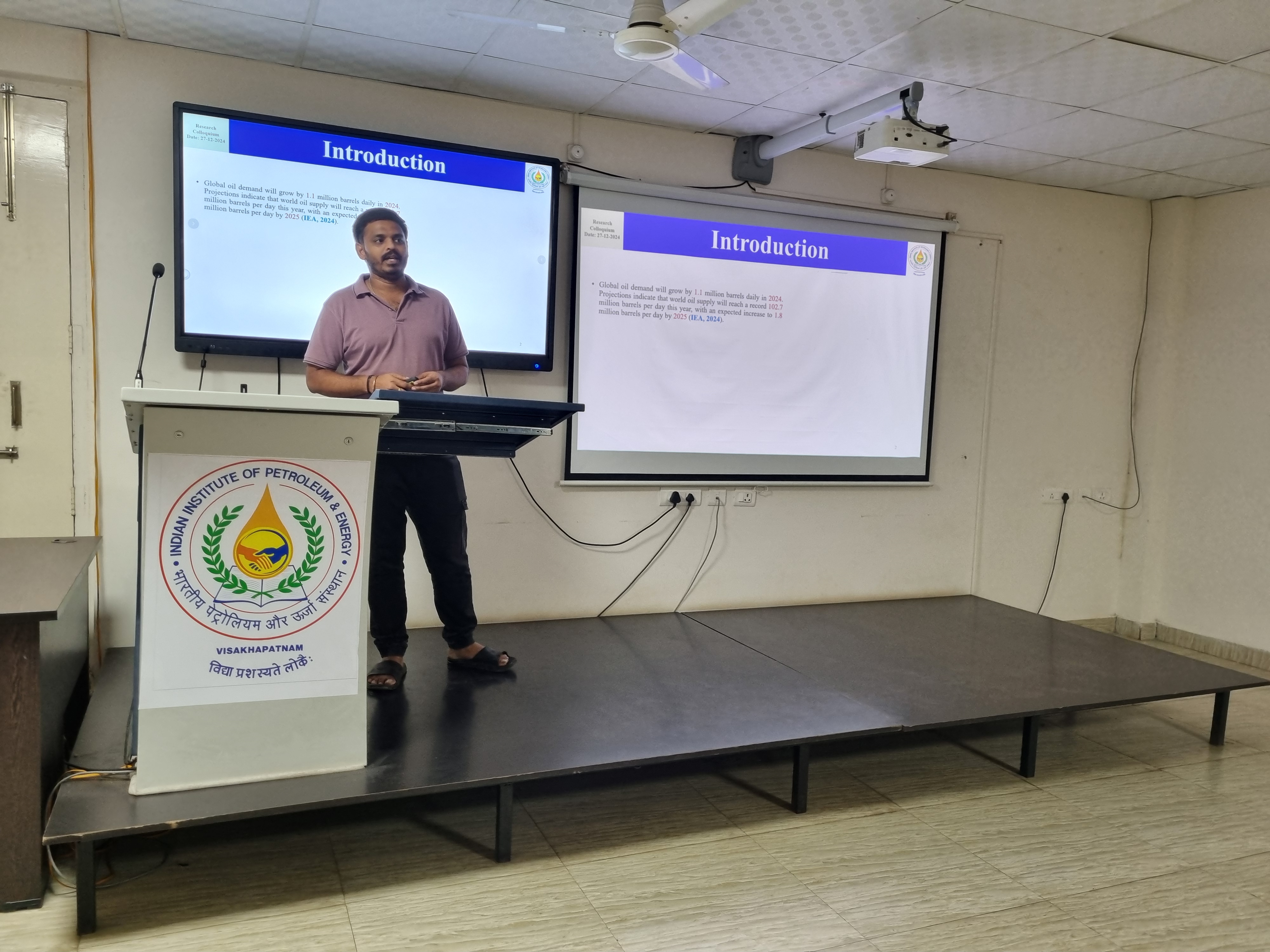
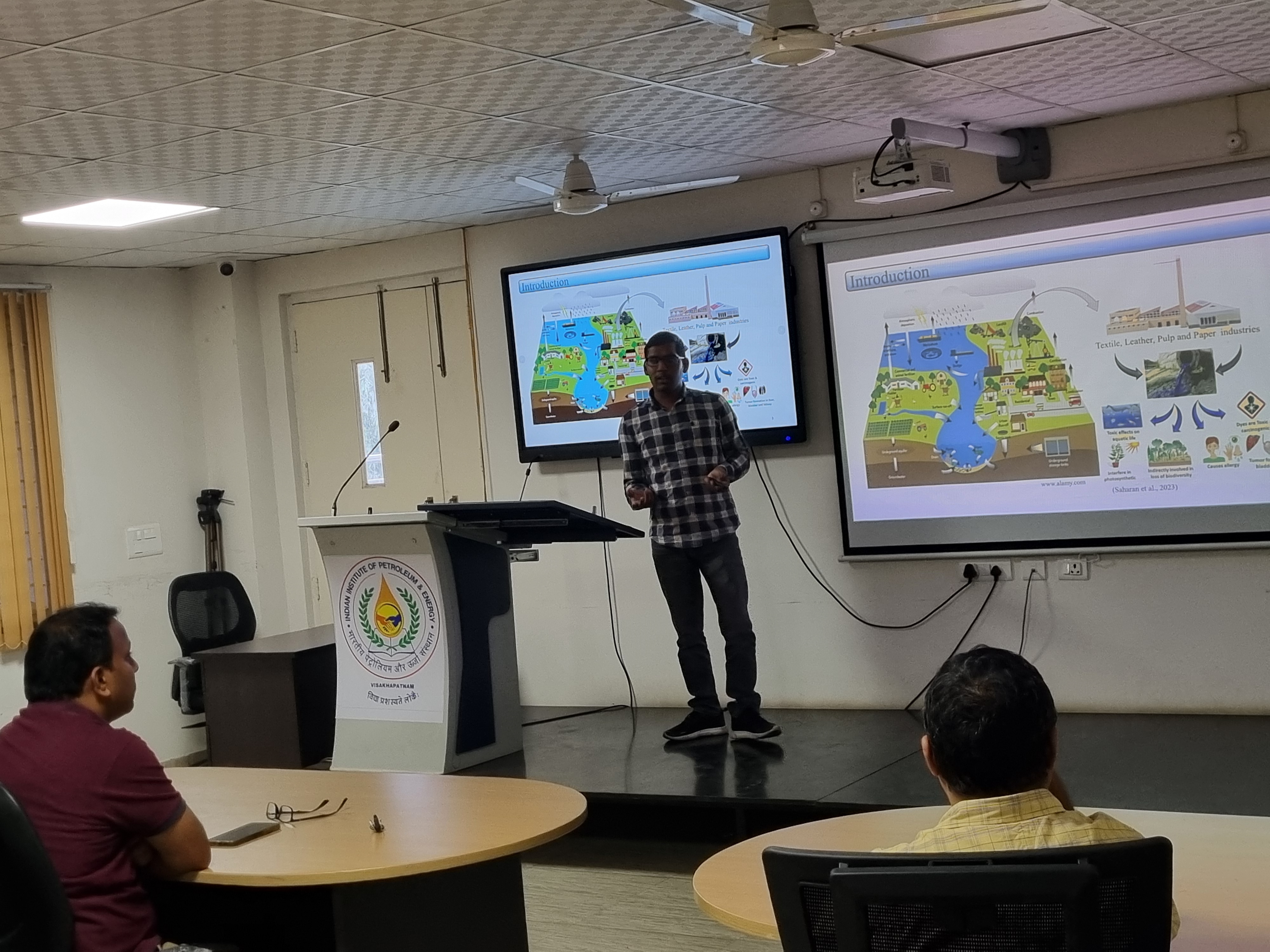
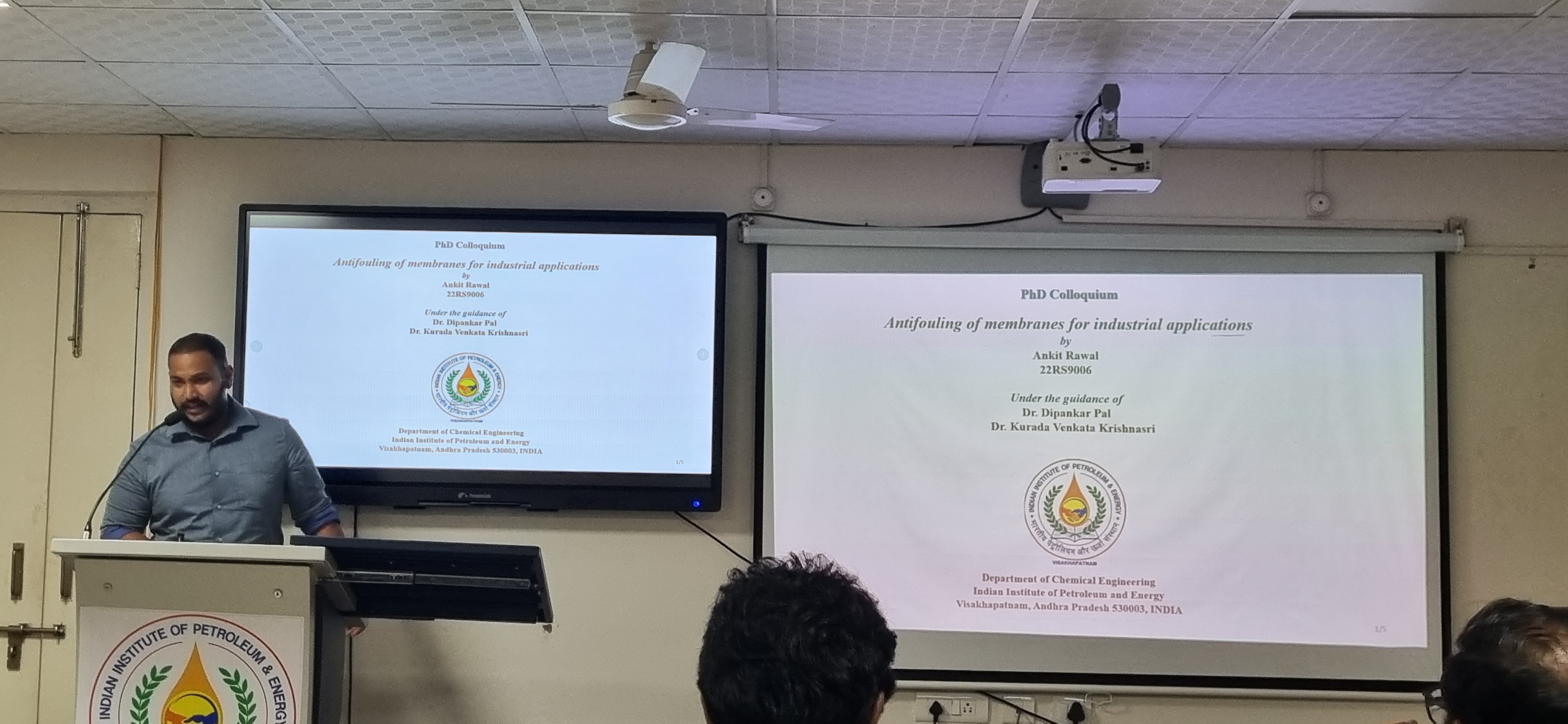
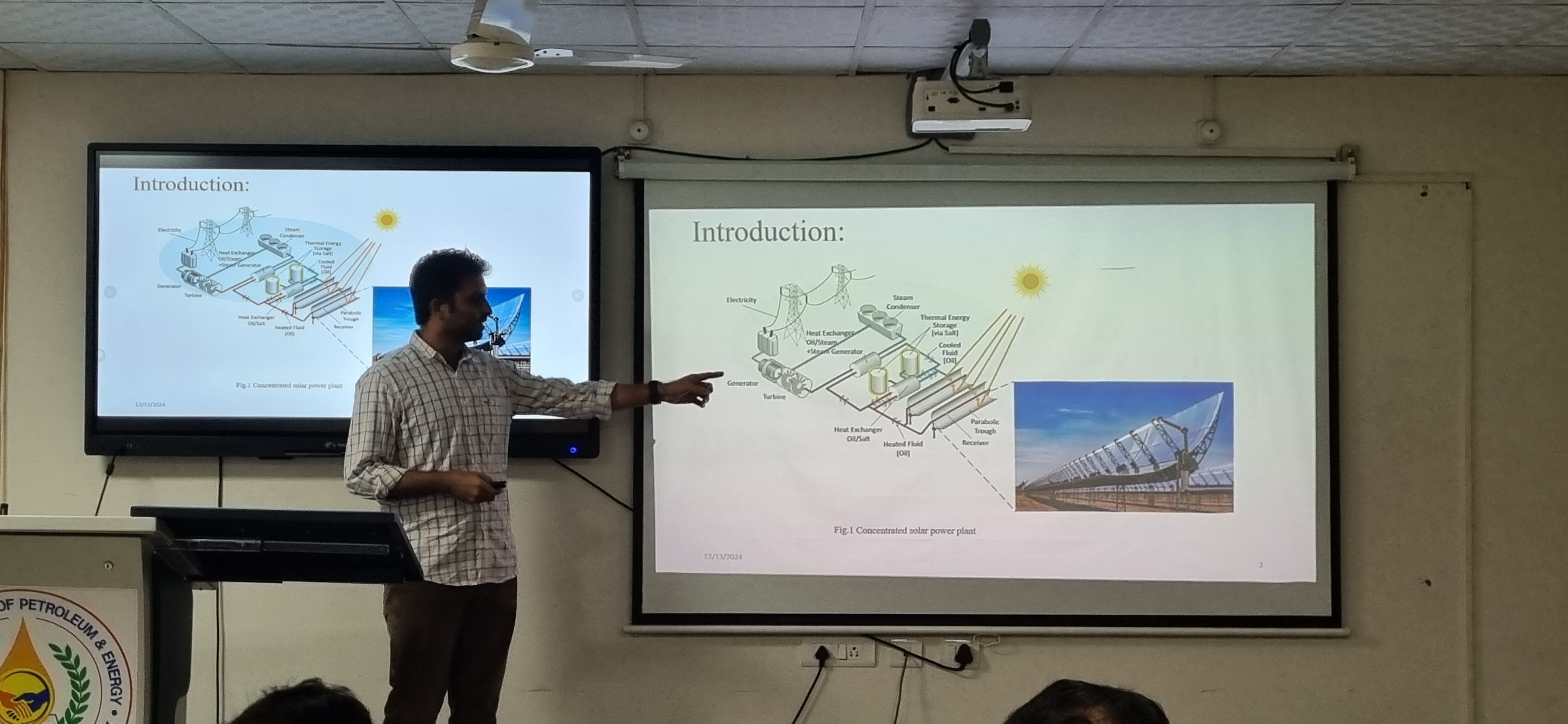
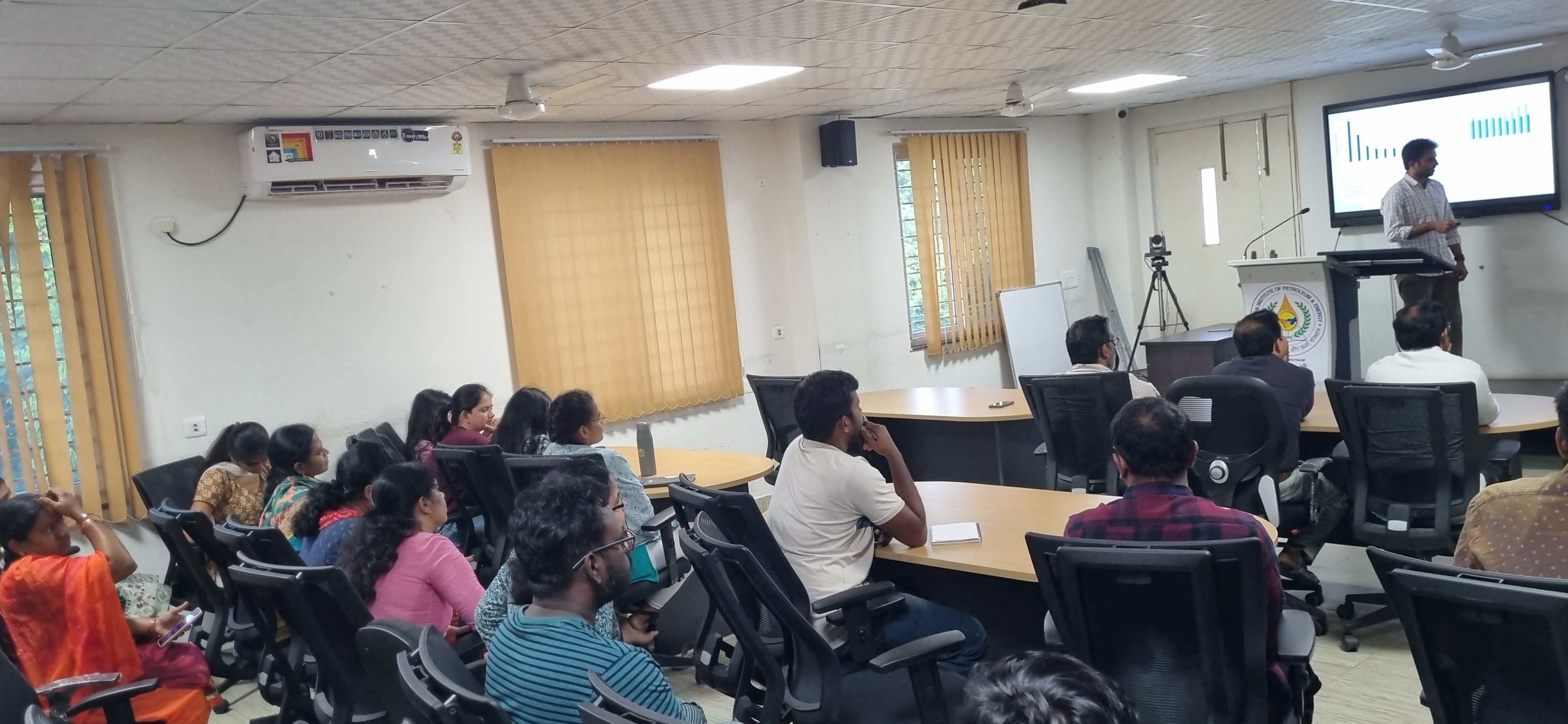
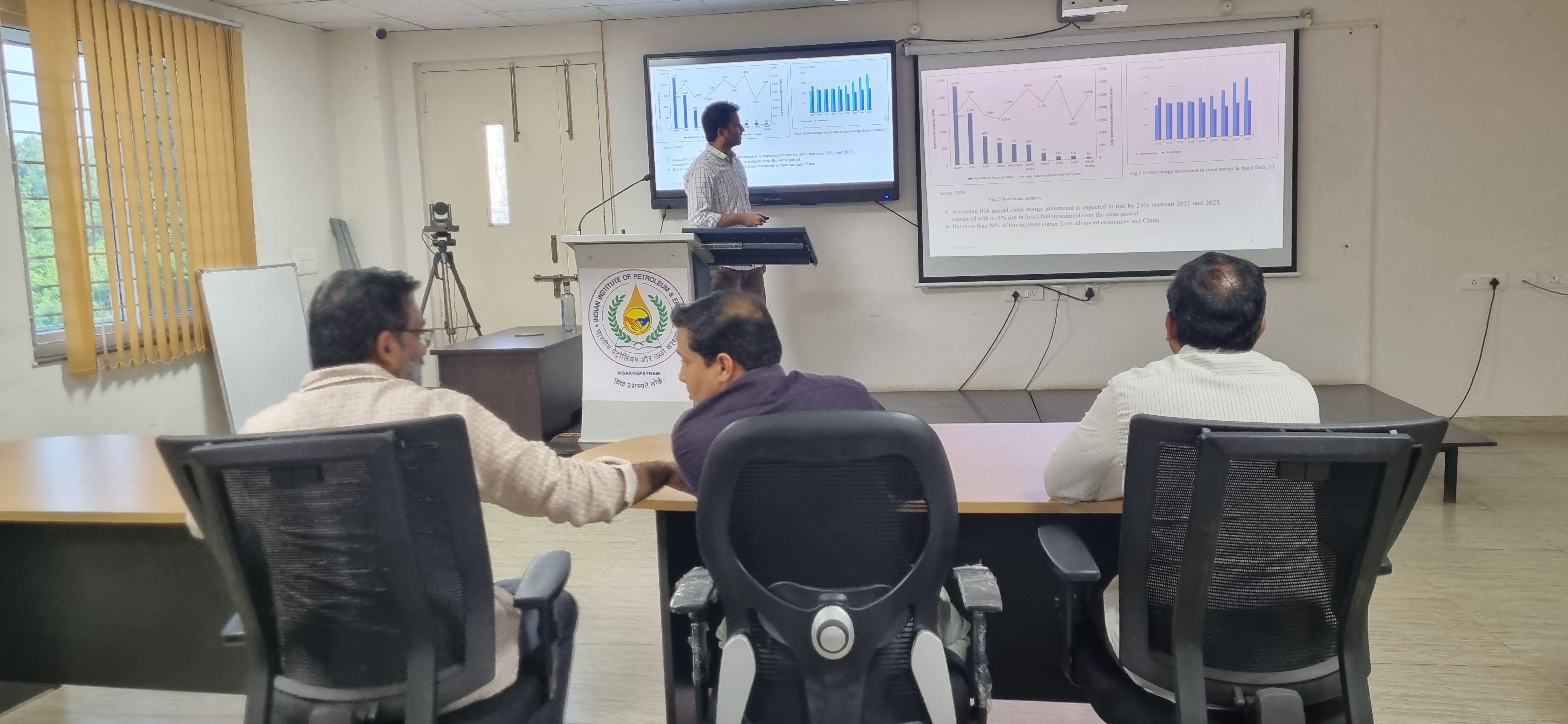
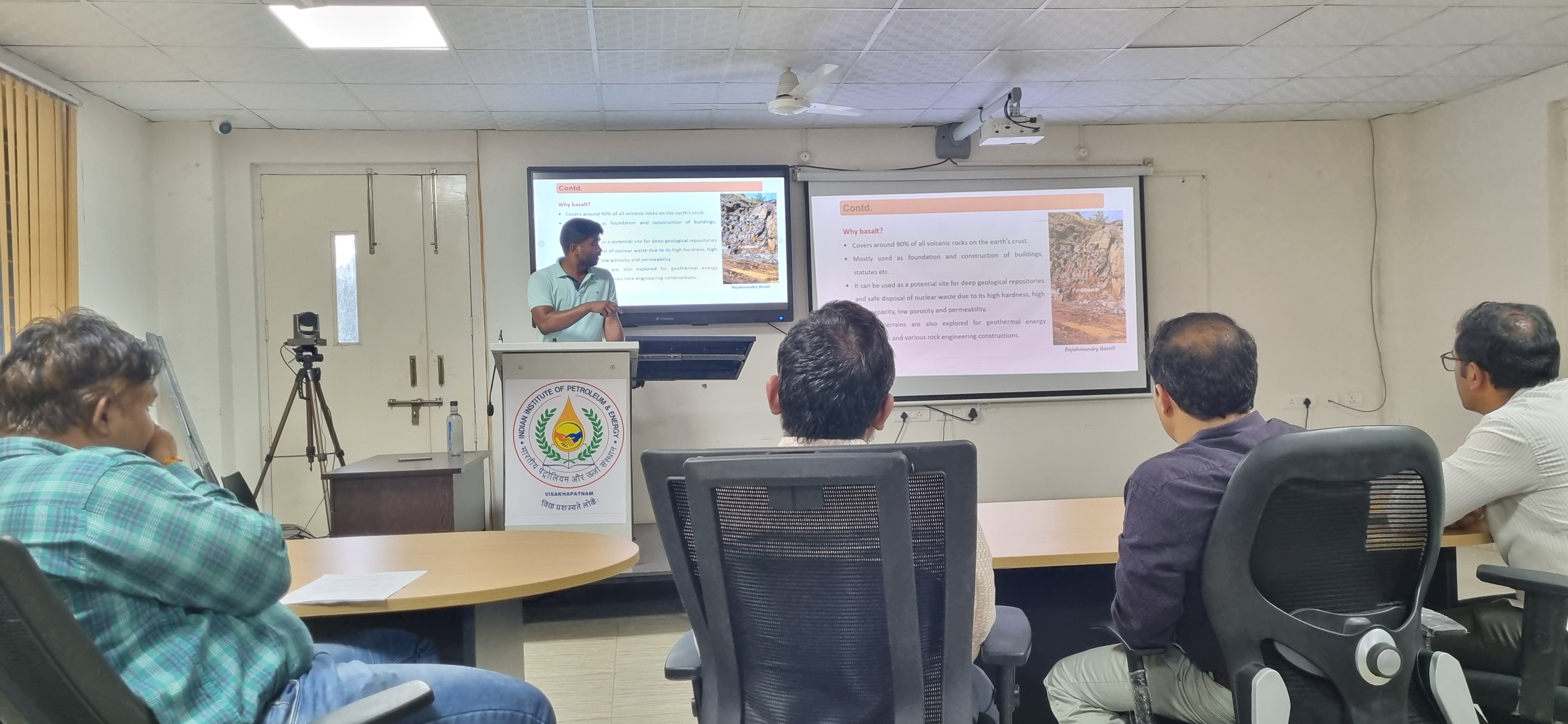
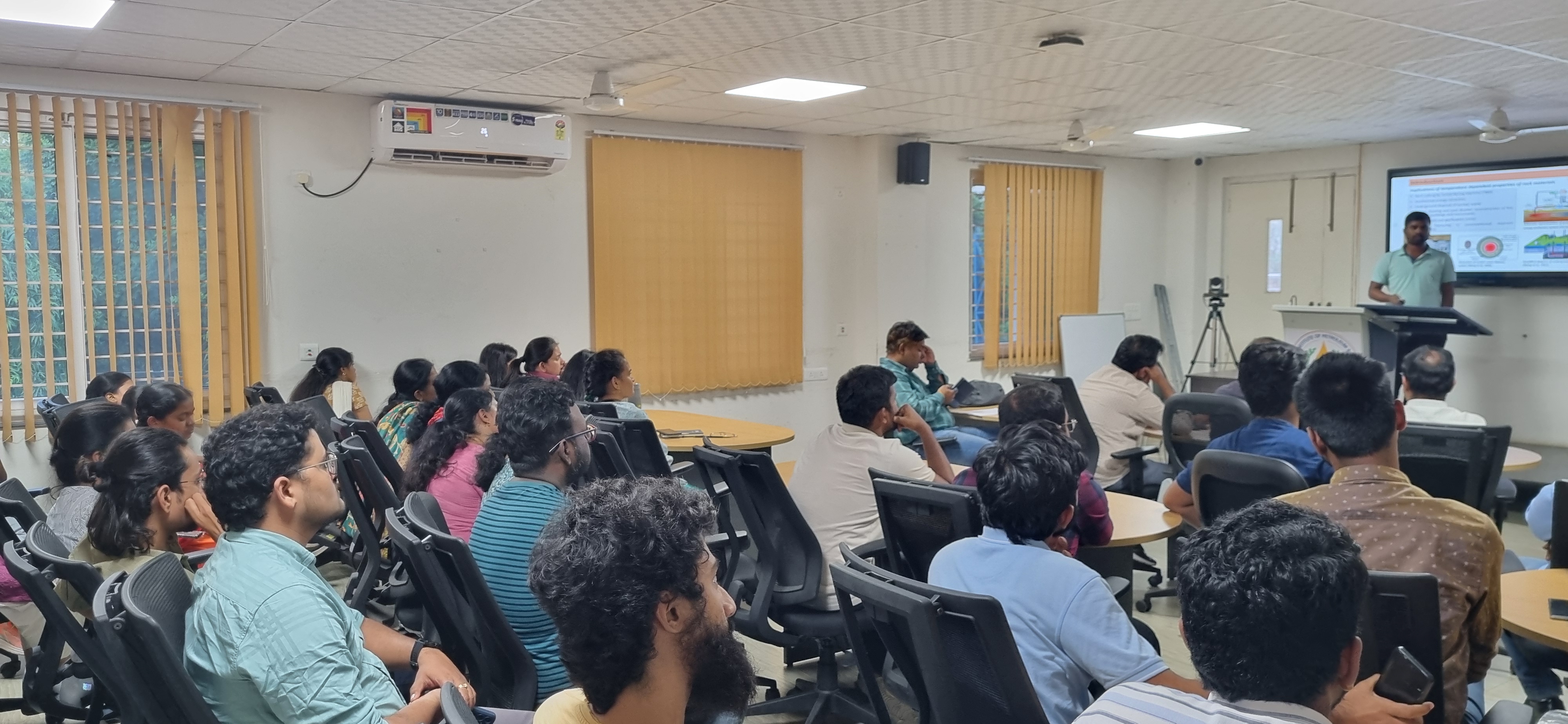
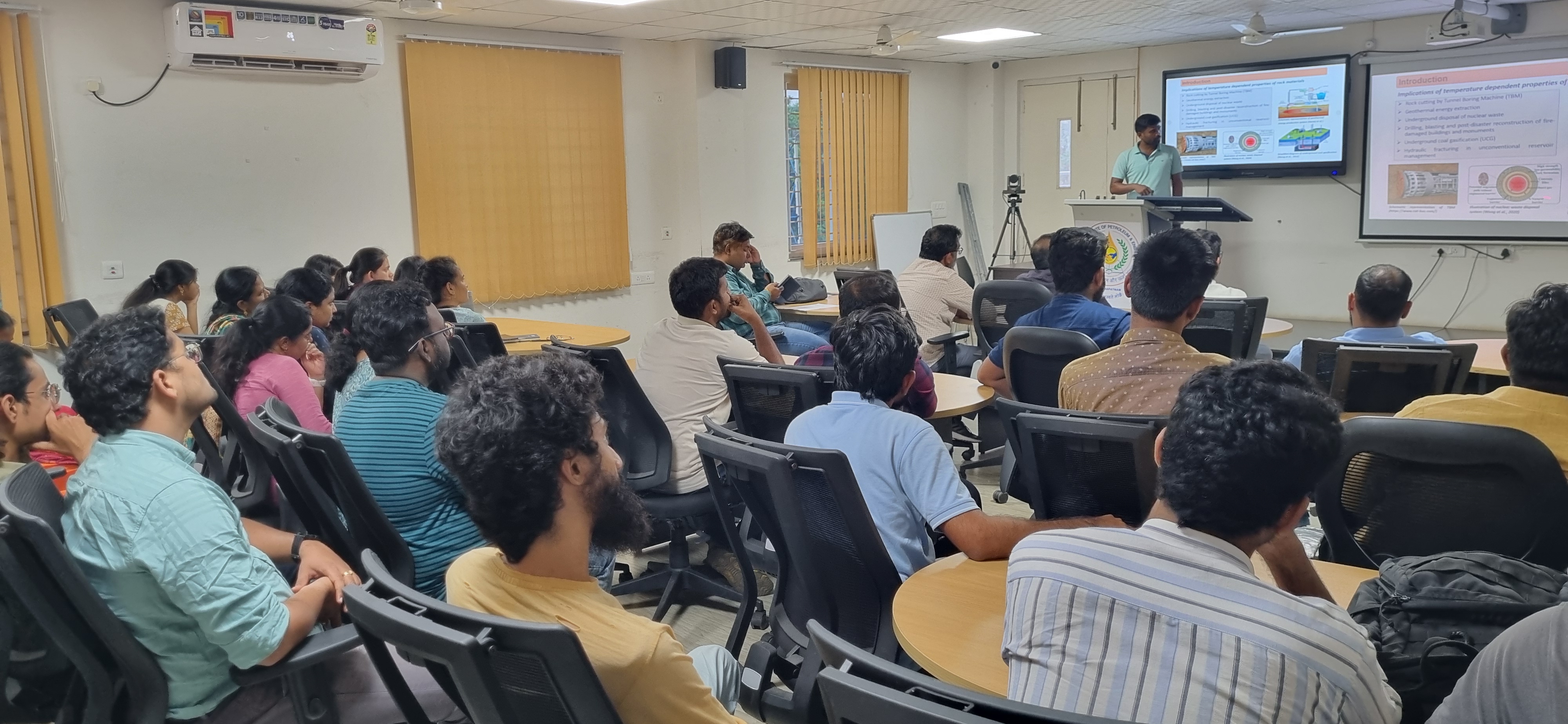
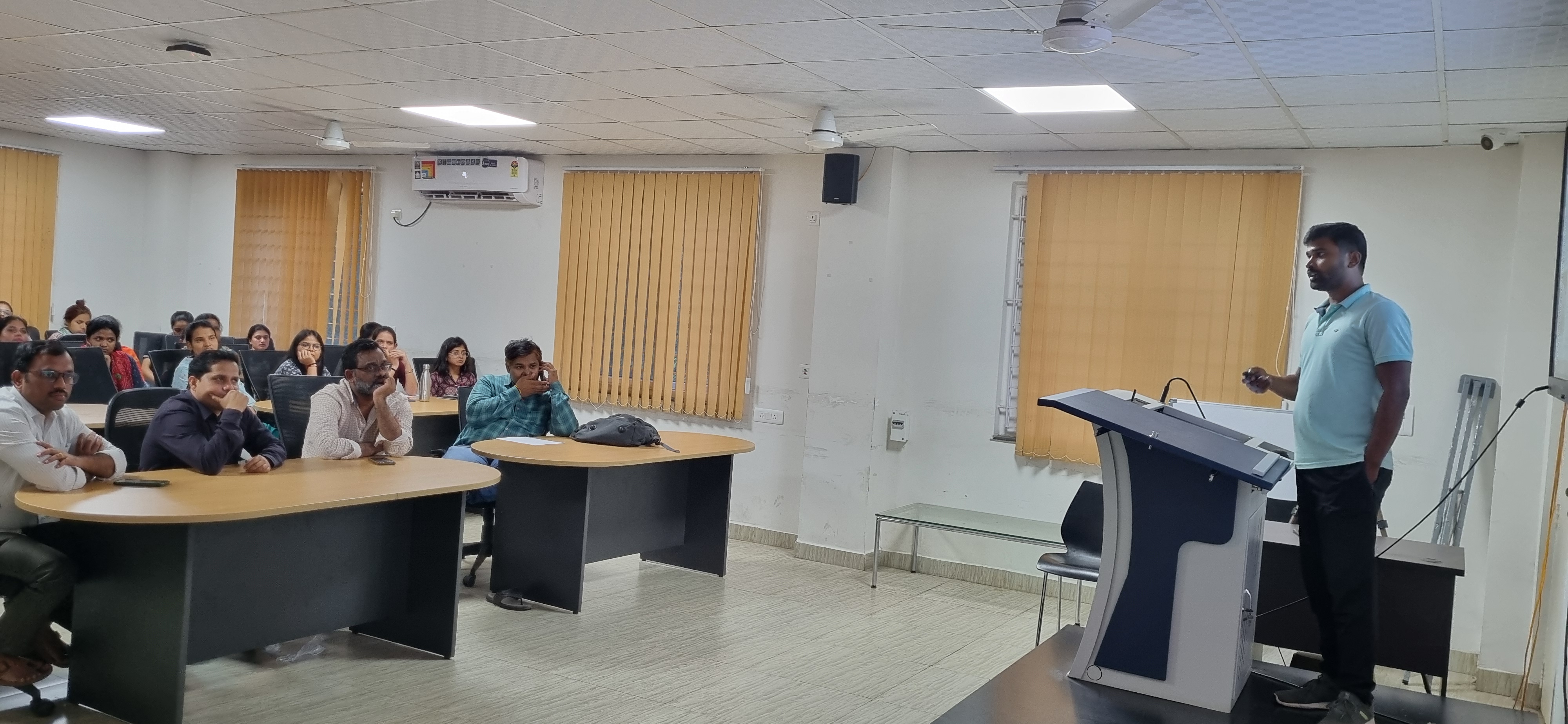
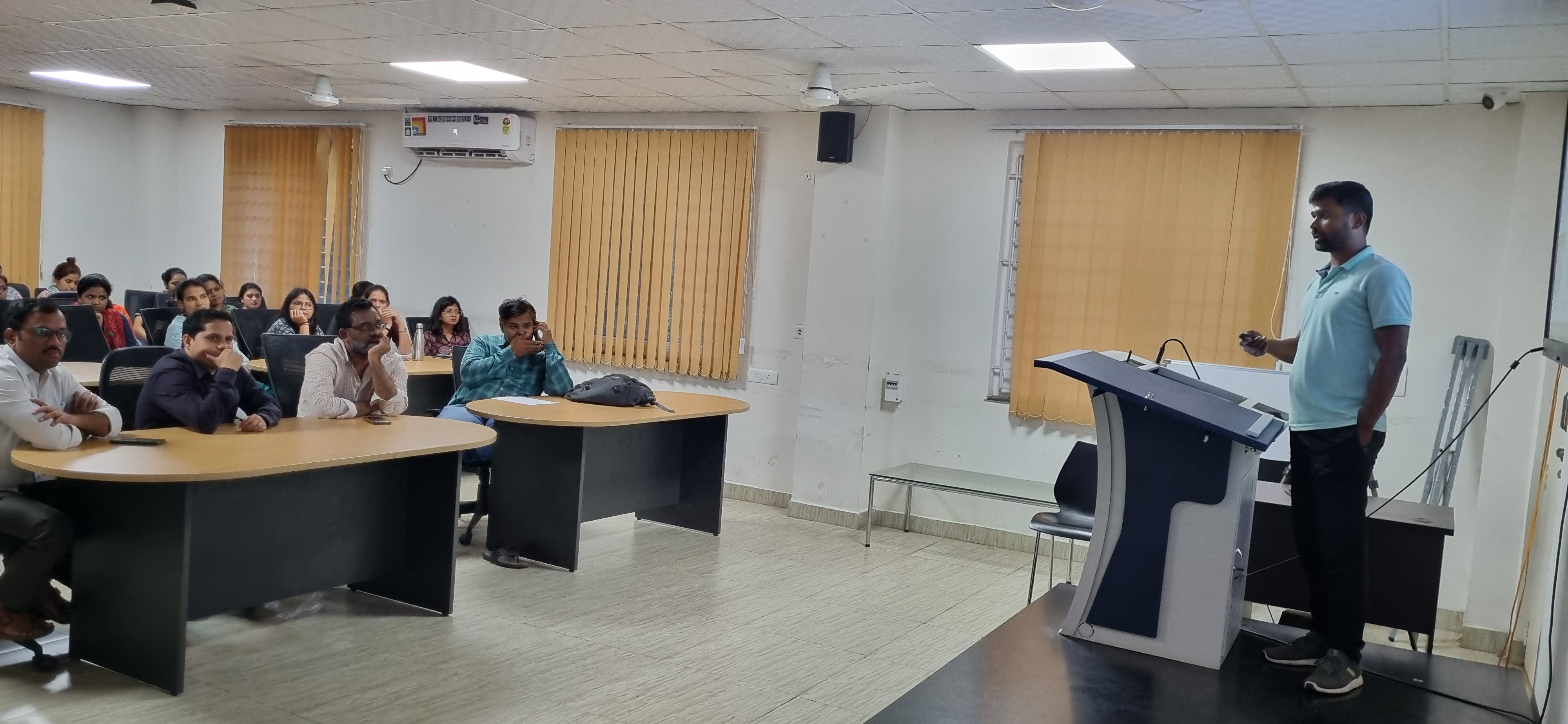
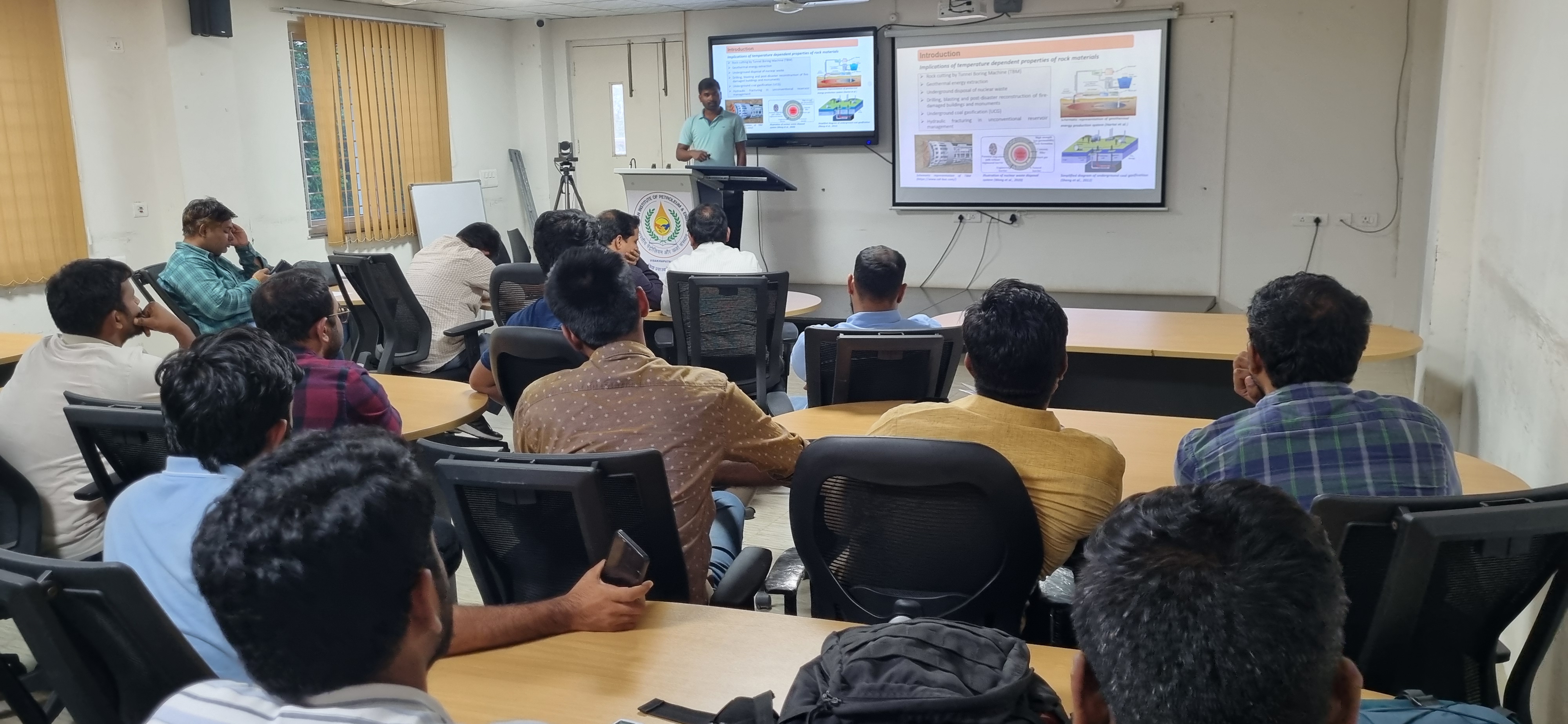





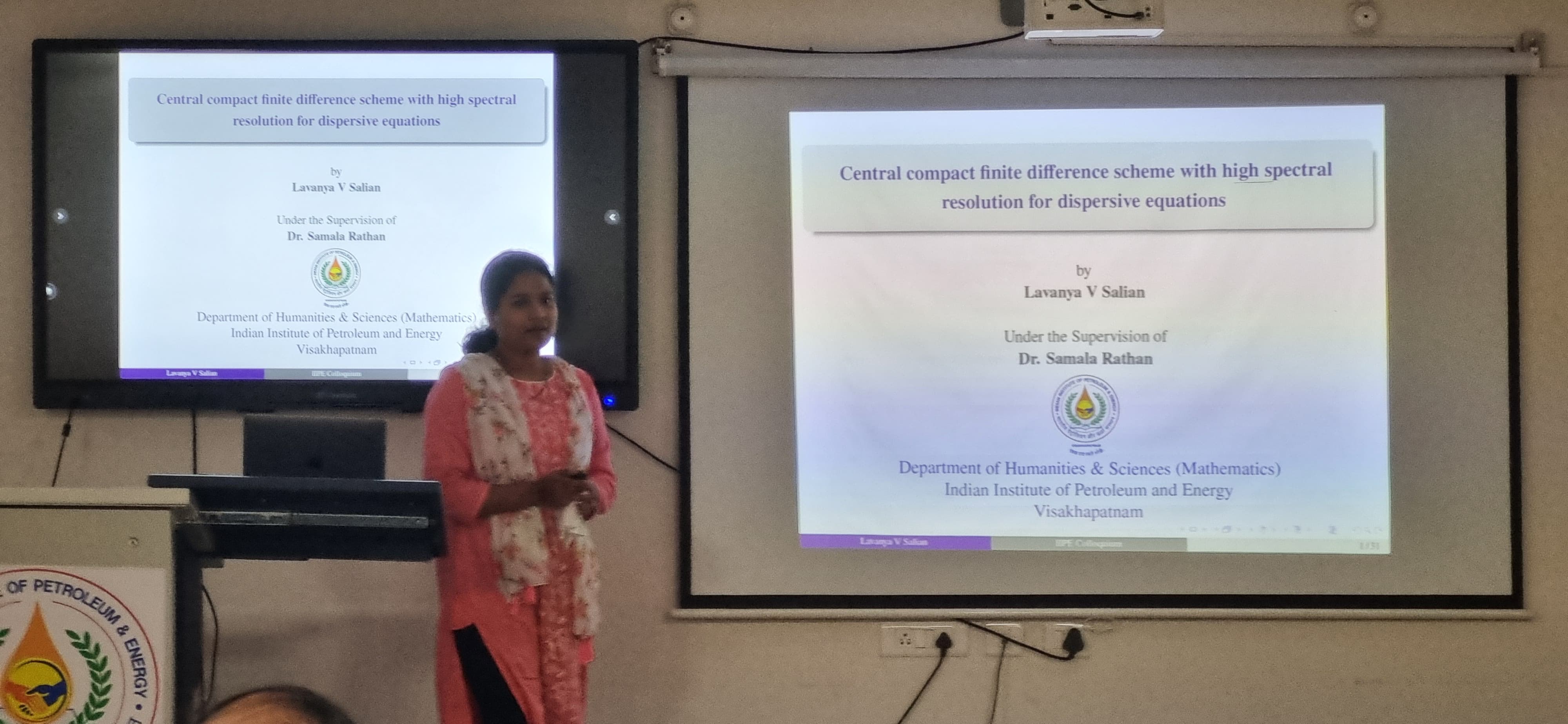
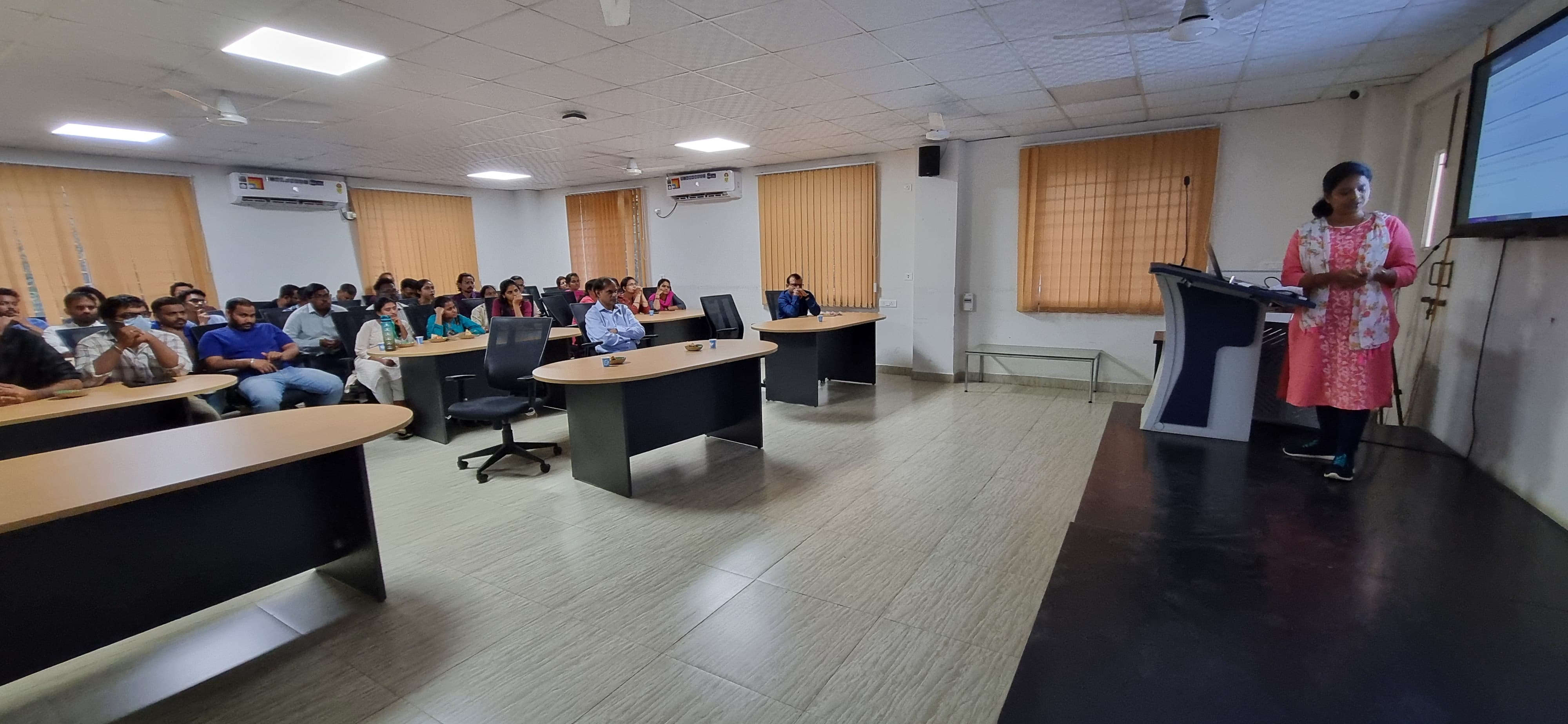
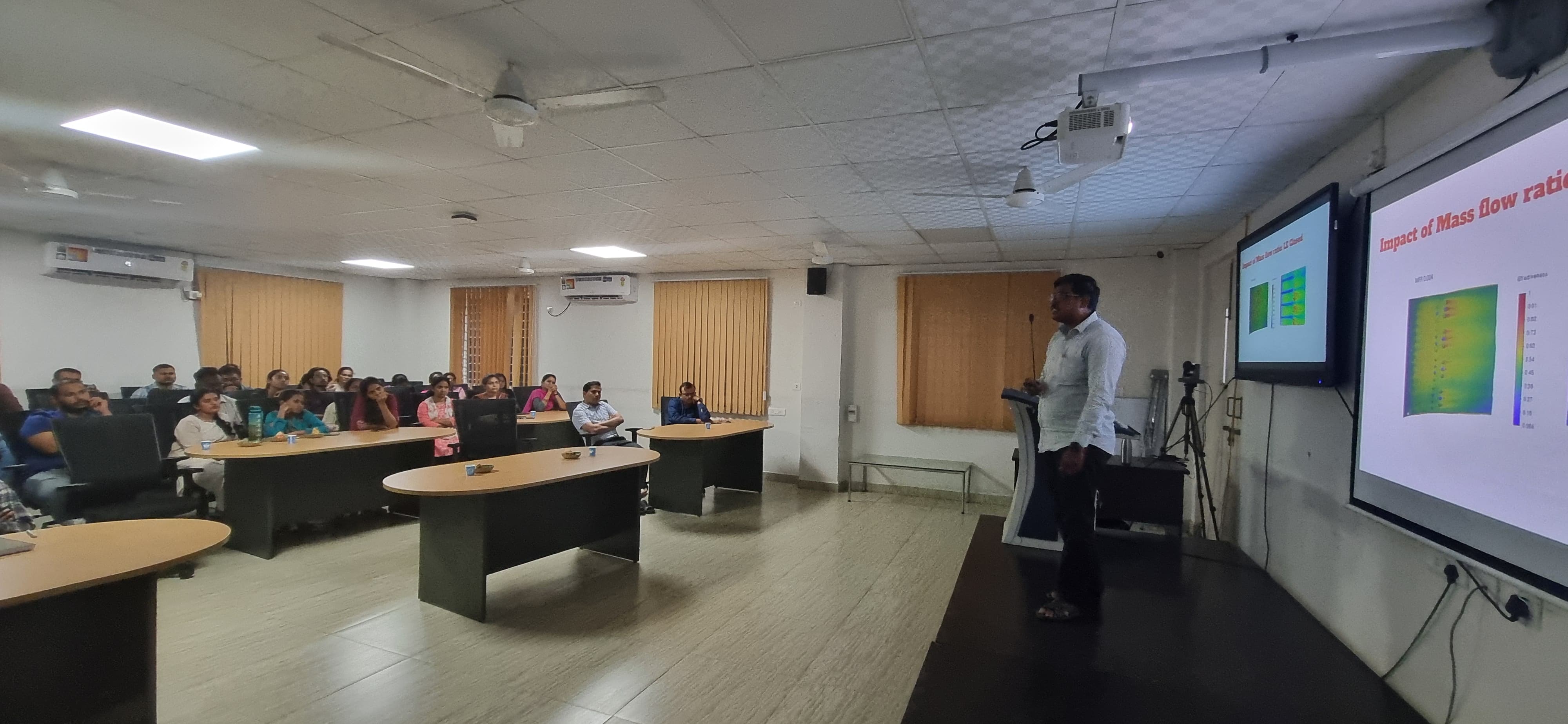
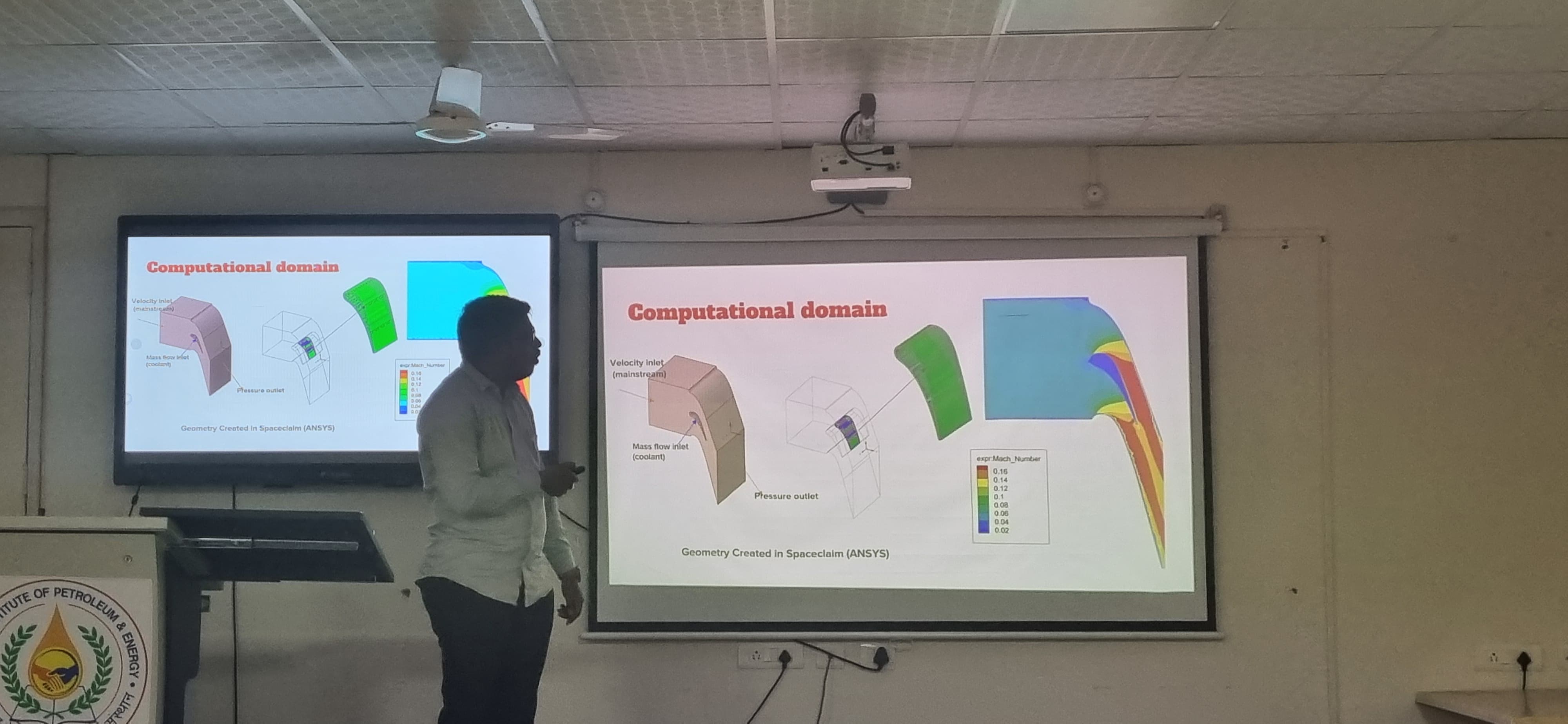
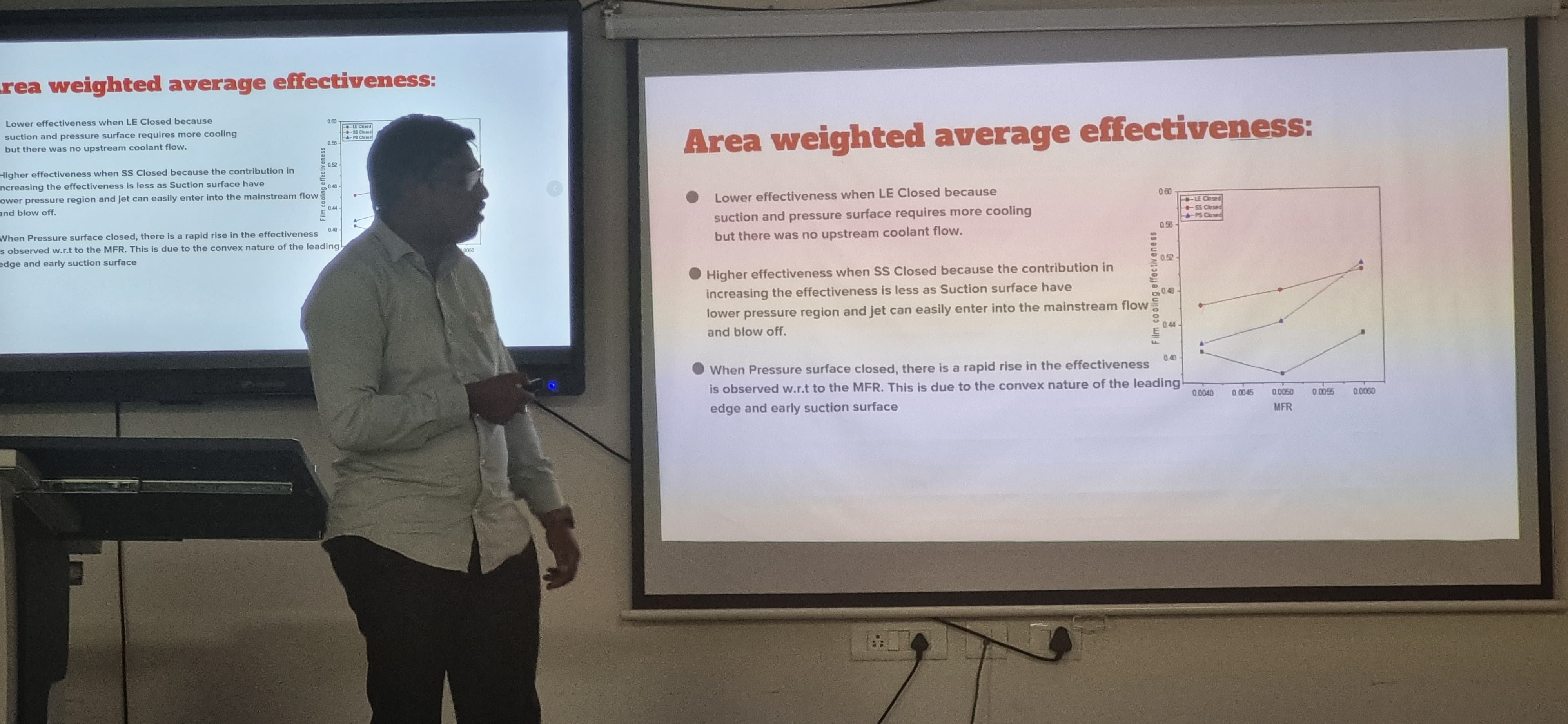
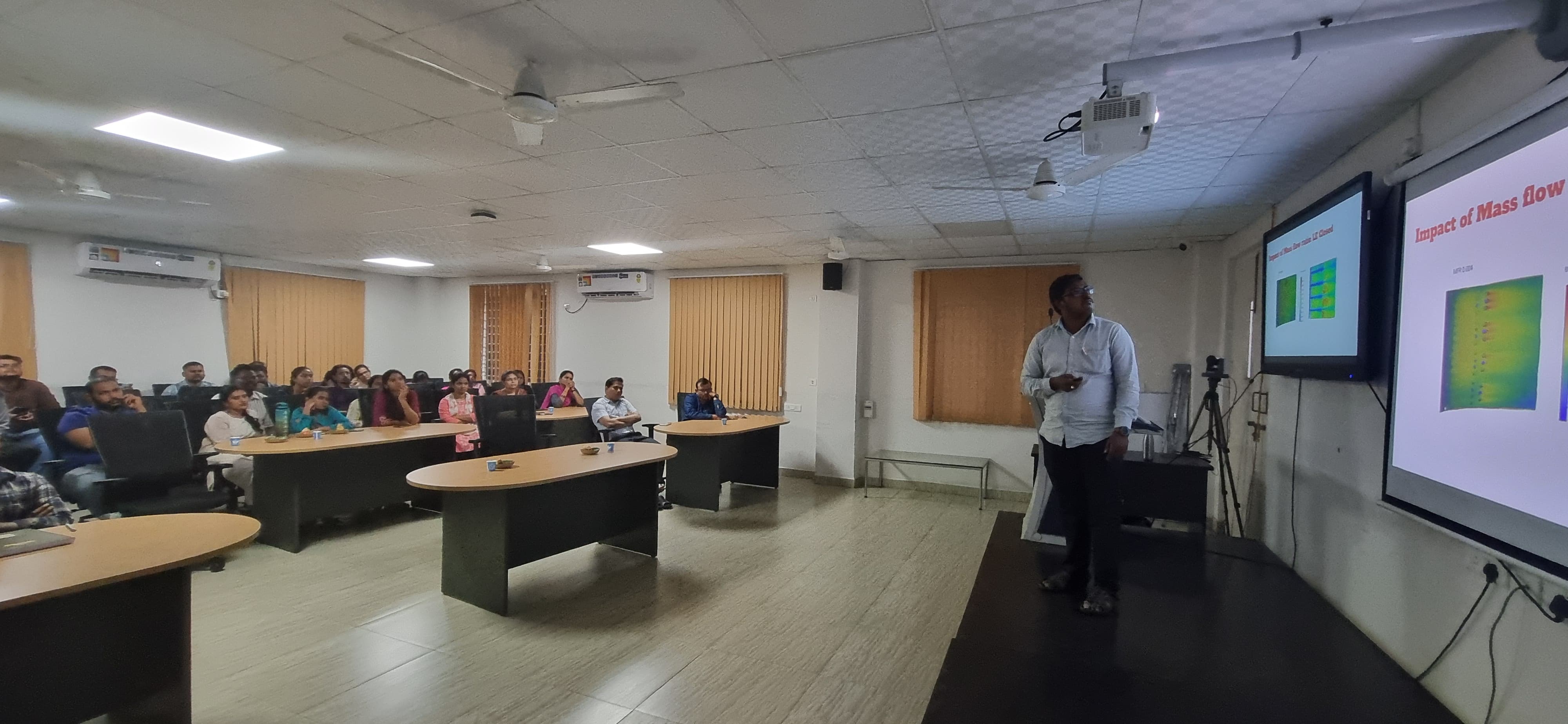
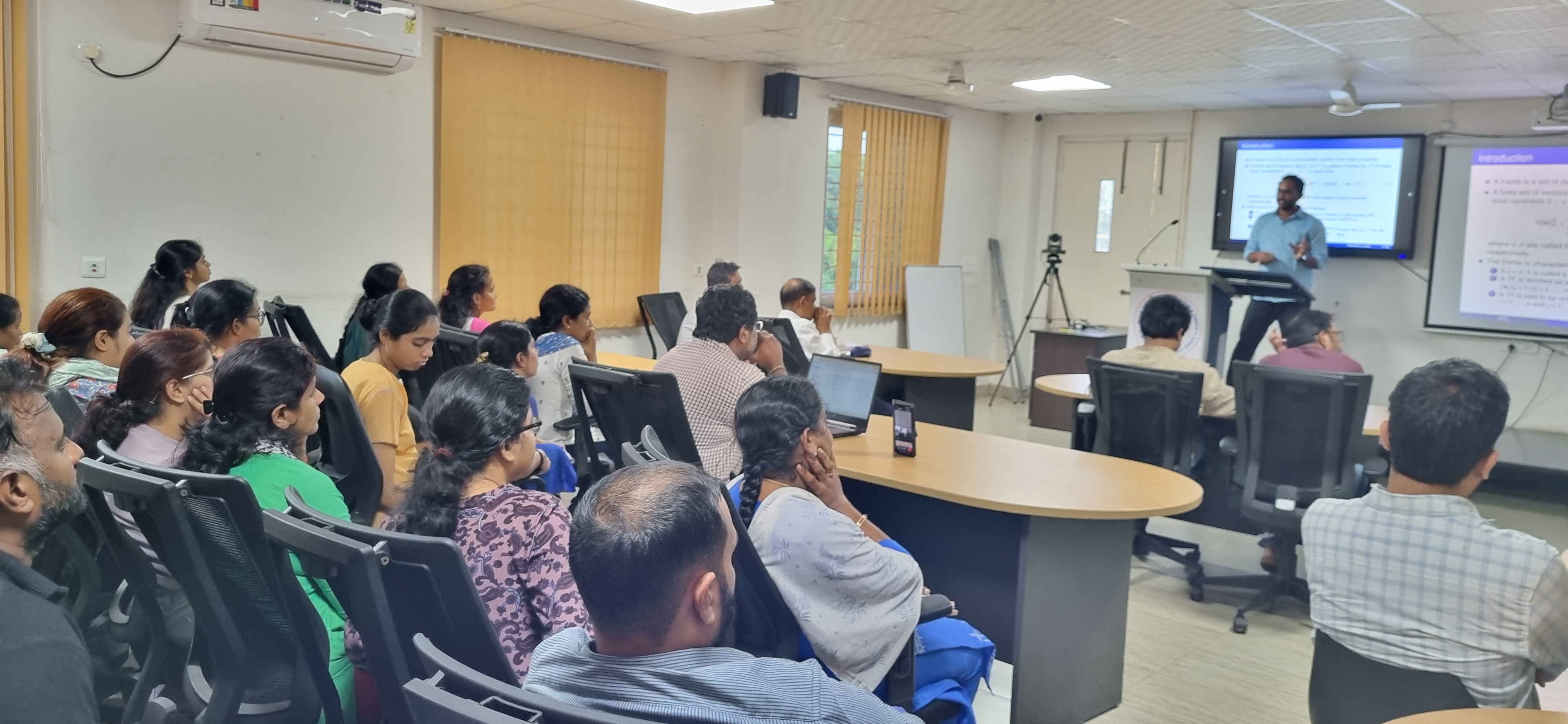
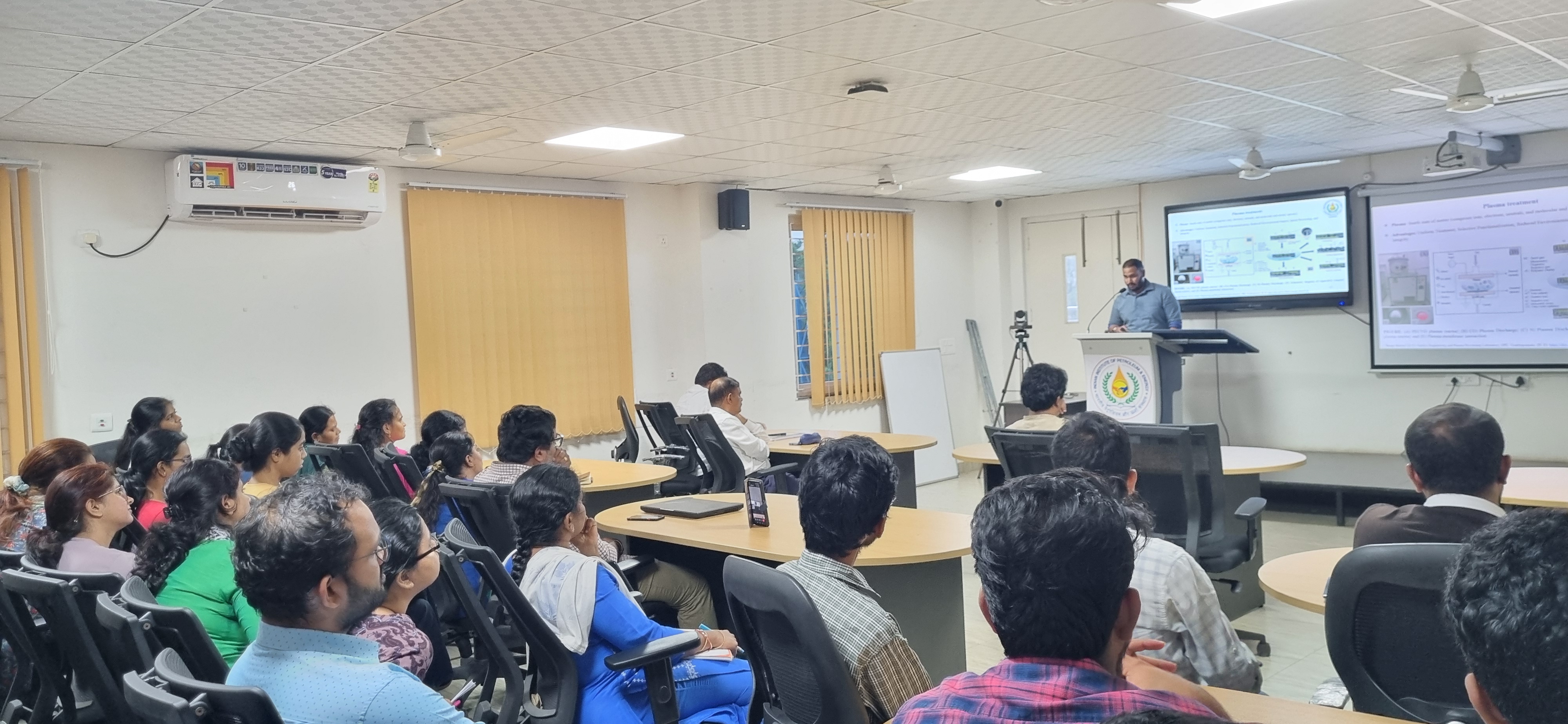
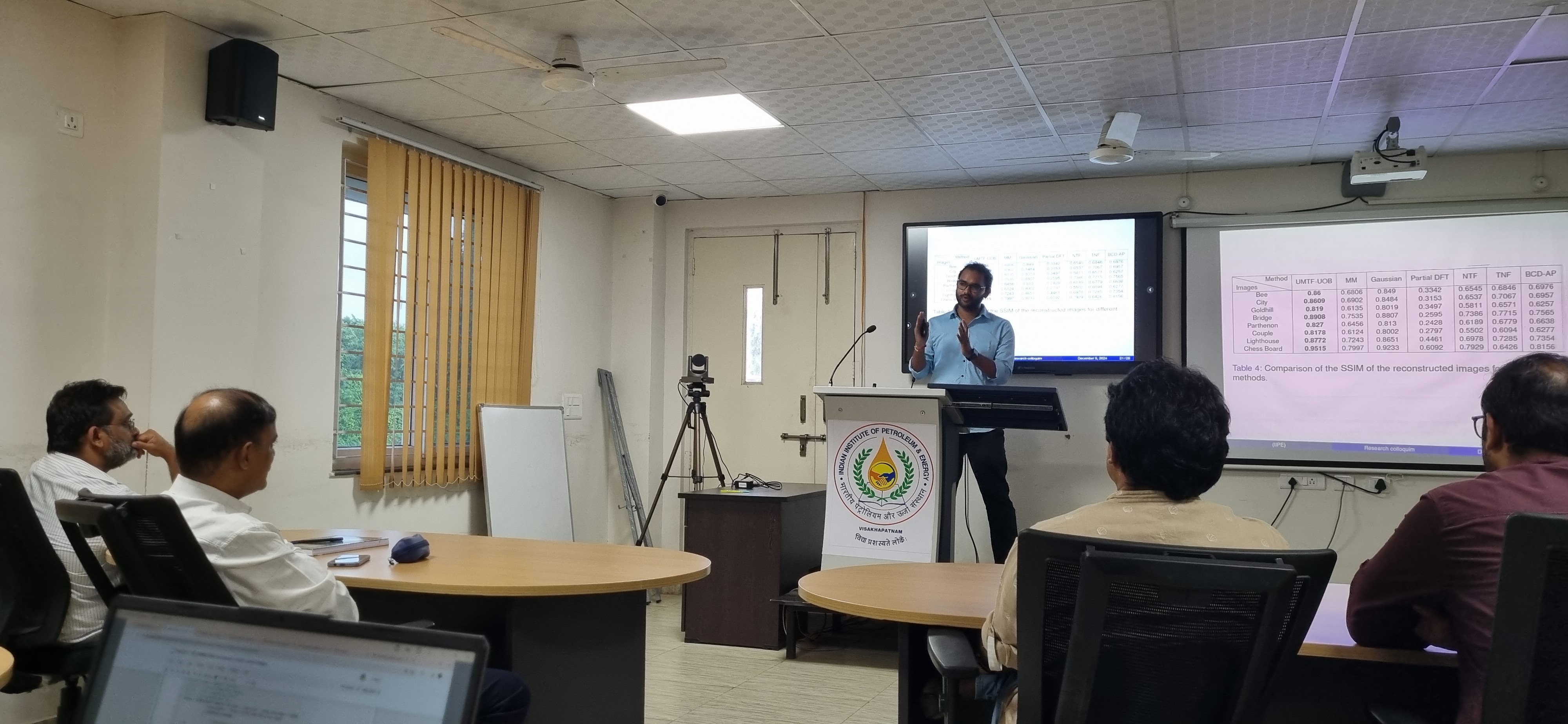
Iradat Hussain Mafat (23RS9017)
Topic - Theoretical and Experimental Investigation of Carbon Dioxide (CO₂) Capture from Flue Gases by Metal-Organic Frameworks (MOFs)
Presentation Date: 04 April 2025Time:
Location: Seminar Hall, New Building, Indian Institute of Petroleum and Energy
Summary of the presentation – Metal-organic frameworks (MOFs) have emerged as promising materials for CO₂ capture due to their tunable porosity, high surface area, and selective adsorption properties. The challenge of mitigating CO₂ emissions from industrial sources has driven extensive research into designing MOFs with optimized adsorption capacities, stability, and regenerability. Experimental synthesis and characterization, combined with theoretical modeling, provide valuable insights into these materials' adsorption mechanisms and performance. Understanding the interplay between MOF structure and CO₂ interaction is crucial for developing next-generation adsorbents with enhanced efficiency, paving the way for sustainable carbon capture technologies in energy and environmental applications.
Komal Kumari (23RS9016)
Topic - Carbon-based Materials for Energy Storage Applications
Presentation Date: 04 April 2025Time:
Location: Seminar Hall, New Building, Indian Institute of Petroleum and Energy
Summary of the presentation – Efficient and sustainable storage technology is required to fulfill the future energy demand. There are many ways to store energy, but batteries and supercapacitors are more portable than others. These technologies aim to be sustainable, eco-friendly, pollutant-free, and easily recyclable and are based on energy density, power density, efficiency, conductivity, voltage range, and current density. These main features are highly affected by the parameters of electrodes. These parameters include high chemical/thermal stability, large surface area, controlled porosity, cost-effectiveness, and high electronic conductivity. Due to their large surface area and corrosion resistance properties, carbon-based electrodes have a wide operating temperature range, high conductivity, good cyclic stability, and durability. Functionalization of surface, pore size, and specific surface area are the three main factors that should be considered while discussing the specific capacitance of electrodes. The biomass-derived activated porous carbon-based electrode, which is sustainable and environmentally friendly, can have the capability to achieve commercial success in future energy storage applications.
Mahendra Kumar (23RS9P21)
Topic - Optimization Guarantees of Unrolled Networks
Presentation Date: 21 March 2025 Time:
Location: Seminar Hall, New Building, Indian Institute of Petroleum and Energy
Summary of the presentation – Deep unrolled networks have set new performance benchmarks in domains such as compressed sensing, image processing, and medical imaging. These networks are constructed by unfolding iterative algorithms, where each iteration is mapped to a neural network layer with learnable parameters, enabling task-specific adaptation and improved convergence. Despite offering improved interpretability and faster processing compared to conventional deep neural networks, the theoretical foundations of these unrolled networks remain an active area of research and are not yet fully established. Therefore, providing guarantees for the convergence, stability, and optimality of unrolled neural networks requires rigorous theoretical analysis, which is essential for their deployment in safety-critical applications such as medical imaging and autonomous driving.
Nagur Vali Shaik (23RS9010)
Topic - Functional Nanofluids for Improved Oil Recovery (IOR): Design, Physicochemical Evaluation and Optimization
Presentation Date: 21 March 2025Time:
Location: Seminar Hall, New Building, Indian Institute of Petroleum and Energy
Summary of the presentation – Enhanced oil recovery (EOR) is a needed method for extracting additional oil from reservoirs when conventional techniques are insufficient. This study investigated CuO, SiO₂, and ZnO nanoparticles, focusing on their stability and rheological properties at different temperatures (30°C, 50°C, and 70°C). ZnO and CuO nanoparticles underwent a 360-day stability assessment, demonstrating excellent stability. Based on the stability and rheology data, an optimized sample was developed and combined with two polymers. The viscosity and viscoelasticity profiles of the composite were analyzed across the temperature range. Additionally, a nanocomposite was synthesized and subjected to stability and rheology studies, confirming its potential for EOR applications. This research provides valuable insights into optimizing nanofluids for practical use in oil fields. Future studies should address environmental impacts, improve simulation accuracy, and focus on cost reduction to enhance the feasibility of nanofluid-based EOR.
Sk Md Atique Anwar (23RS9P06)
Topic - Non-Negative Sparse Signal Recovery: Model-Based to Model-Aware Data-Driven Methods
Presentation Date: 21 March 2025Time:
Location: Seminar Hall, New Building, Indian Institute of Petroleum and Energy
Summary of the presentation – Linear inverse problems involving non-negative sparse approximations are essential in various applications such as face recognition, DNA microarrays, and spectral unmixing. Recent advancements in ReLU-based algorithms, such as ReLU-based hard thresholding and momentum-boosted adaptive thresholding (MBAT), solve this problem by leveraging the rectified linear unit (ReLU) in combination with thresholding operators to produce non-negative sparse solutions. Despite these developments, challenges persist in achieving high recovery performance and faster convergence. To address these issues, we propose a novel ReLU-based algorithm for non-negative sparse signal recovery, termed ReLU-based Hard Thresholding Pursuit (RHTP). Specifically, RHTP integrates the ReLU within the hard thresholding pursuit framework to enable efficient recovery of non-negative sparse signals. We derive sufficient criteria for ensuring the stable recovery of sparse signals generated from RHTP based on the restricted isometry property and mutual coherence. Numerical experiments demonstrate that RHTP outperforms existing algorithms in recovering binary sparse signals and delivers comparable performance to the state-of-the-art MBAT algorithm in recovering non-negative sparse Gaussian signals.
Muvvala Chinnam Naidu (23RS9P17)
Topic - Transcrustal Magmatic Plumbing System of Alkaline Rocks: Insights from the Shonkinite Dykes (Elchuru Alkaline Complex, SE India)
Presentation Date: 21 February 2025Time:
Location: Seminar Hall, New Building, Indian Institute of Petroleum and Energy
Summary of the presentation – The textures and mineral compositions reveal significant clues on the physical conditions of magma plumbing and emplacement. Recent studies have recognized magma differentiation at multiple depths and magma migration as crystal mushes as essential modes of melt transport. The present study demonstrates that mantle-derived low-degree potassic melts with high ascent rates have also undergone transcrustal magma differentiation. The Mesoproterozoic Elchuru alkaline complex in the Prakasam Alkaline Province (PAP), Eastern Ghats Belt, SE India, is intruded by coeval shonkinite dykes. Parental magmas to both the host nepheline syenite and shonkinite dykes were produced during ca. 1350 Ma continental-rift related magmatism. The shonkinite dykes show fine-to-medium-grained equigranular to porphyritic textures with clinopyroxene, biotite, amphibole, K-feldspar perthite, nepheline, and plagioclase as major mineral phases. Based on the mineral-melt chemical disequilibrium and P-T estimates of mineral crystallization, this study proposes a magmatic evolution framework involving a transcrustal magmatic system.
G. Jayasri (23RS9021)
Topic - Metal-Organic Frameworks for Drug Delivery Systems: Approach for Targeted and Controlled Drug Release
Presentation Date: 21 February 2025Time:
Location: Seminar Hall, New Building, Indian Institute of Petroleum and Energy
Summary of the presentation – This research addresses the limitations of conventional cancer therapies by developing Metal-Organic Frameworks (MOFs) as targeted and controlled drug delivery systems. Current challenges in drug delivery include non-specific distribution, systemic toxicity, and poor loading efficiency. To overcome these, MOFs offer a promising solution due to their high porosity, tunable structure, and potential biocompatibility. As a preliminary step, the zinc-based MOF ZIF-8 was investigated for its interaction with 5-Fluorouracil (5-FU), a widely used anticancer drug. Density Functional Theory (DFT) studies revealed that ZIF-8 can stably bind up to five 5-FU molecules, highlighting its potential for sustained release. Additionally, 143 MOFs from Melle et al. (2025) were screened using machine learning to predict drug loading capacity and cytotoxicity. This screening identified Zn, Fe, and Zr-based MOFs as suitable for drug delivery due to their lower predicted toxicity, while Cr- and Cu-based MOFs were less favourable. To address current research gaps such as the need for predictive modelling and biocompatibility validation, future work includes Grand Canonical Monte Carlo (GCMC) simulations to assess adsorption behaviour and in vitro cytotoxicity studies to confirm therapeutic potential. This integrated approach aims to guide the rational design of efficient, safe, and selective MOF-based drug delivery platforms.
AKHIL ARAVA (23RS9019)
Topic - Intelligent Decision Support System for Resilient Water Distribution Networks
Presentation Date: 14 February 2025Time:
Location: Seminar Hall, New Building, Indian Institute of Petroleum and Energy
Summary of the presentation – Urban water distribution systems face growing challenges from population growth, climate change, and infrastructure aging. To address these, this research proposes an Intelligent Decision Support System (IDSS) for resilient water distribution networks (WDNs), grounded in a real-time cyber-physical testbed. Developed at IIPE, the Smart Water Distribution Network (SWaDNet) testbed mimics a real-world urban WDN, combining both physical and cyber components to enable real-time monitoring, control, and experimentation. The physical layer consists of two elevated tanks, six consumer tanks, a storage tank, solar panels, pumps, pneumatic control valves, and sensors for flow, pressure, and level. The cyber layer is built using PLCs and a SCADA system, allowing seamless control and data acquisition. This integration forms a cyber-physical system capable of closed-loop operations and real-time decision-making. Advanced control strategies, including FOPID, will also be explored for better performance and stability. The ultimate goal is to ensure reliability, sustainability, and resilience in urban water networks.
Sudipta Sahu (23RS9P04)
Topic - Implicit-Explicit Numerical Scheme for Hyperbolic Systems of Balance Laws
Presentation Date: 07 February 2025Time:
Location: Seminar Hall, New Building, Indian Institute of Petroleum and Energy
Summary of the presentation – This research investigates the numerical treatment of quasilinear hyperbolic systems with source terms, which are often stiff and computationally demanding. To address these challenges, a central numerical scheme is developed and applied to benchmark models such as the Xin-Jin and Broadwell models, demonstrating its versatility. The proposed method extends the Nessyahu-Tadmor scheme to non-homogeneous systems through a non-splitting approach. By directly incorporating the cell averages of source terms, the scheme ensures improved accuracy and stability. The study highlights the robustness and effectiveness of the method across a range of problems in the context of balance laws.
Reshma Pagoti
Topic - Deep Unrolled Networks for Signal and Image Denoising via Sparse Signal Recovery
Presentation Date: 3rd January 2025Time:
Location: Seminar Hall, New Building, Indian Institute of Petroleum and Energy
Summary of the presentation – Recently, Deep Neural Networks (DNNs) have been developed as a popular approach for addressing the Compressed Sensing problem. Typically, in DNN, a neural network is trained on a designated dataset using a specified loss function and then evaluated on previously unseen test data. Despite their effectiveness, DNNs often lack interpretability and generalizability, frequently relying on trial and error. This reliance results in complex architectures with high training costs and substantial data requirements. To address this, a technique known as algorithm unrolling has been developed. Motivated by this, in this presentation, we discuss the unrolling of the Generalized Orthogonal Matching Pursuit algorithm for signal and image denoising tasks.
Geetha Singh
Topic - Development of Deep Learning Approach to Simulate Fracture Propagation in Rock
Presentation Date: 3rd January 2025Time:
Location: Seminar Hall, New Building, Indian Institute of Petroleum and Energy
Summary of the presentation – The prediction of deformation mechanisms in geological materials is critical for excavation activities, including tunnels, slopes, oil and gas extraction, and mining. Extensive research and development have focused on developing robust computational methods, which traditionally involve numerical approximations of the governing equations to determine displacement or velocity fields under prescribed boundary conditions but face challenges with increasing problem complexity, particularly for non-linear material behavior or data integration. Recently, Physics-Informed Neural Networks (PINNs) have emerged as a promising alternative, embedding governing laws within neural network architectures to solve PDEs and address forward and inverse problems. This work focuses on implementing the PINN model to solve various problems in geomechanics.
Diwakar Patel
Topic - Assessment of Sustainable Materials for Wastewater Remediation
Presentation Date: 27th Dec. 2024Time:
Location: Seminar Hall, New Building, Indian Institute of Petroleum and Energy
Summary of the presentation – The need for clean water is rising due to population growth and intensive industrialization. Industries like textiles, pulp and paper, leather, and tanneries release dye-containing effluent into water sources and are responsible for around 20% of total global wastewater. This research examines the elimination of dyes from industrial dye effluent by adsorption methods utilizing carbon nano onions (CNOs) produced from waste frying oil.
L. Karunakar Reddy
Topic - Numerical Evaluation of PCM Based Energy Storage System
Presentation Date: 13th Dec. 2024
Summary of the presentation:
Latent heat thermal energy storage (LHTES) units utilize phase change materials (PCMs) to effectively store thermal energy and address the challenges of solar energy intermittency and instability. Heat transfer characteristics largely influence the thermo-fluidic efficiency of the LHTES unit during phase transitions. To improve the typically low heat transfer capabilities of PCMs, high-conductivity metal foams are introduced to enhance bulk heat conduction. This study focuses on optimizing the parameters of composite PCM (CPCM) embedded in the LHTES unit, specifically examining metal foam height (H), angle (θ), and porosity (ε), which primarily affect the performance of the CPCM. A series of Taguchi-based orthogonal experiments were conducted to analyze the effects of these variables. The results indicate that metal foam height has a notable influence on the CPCM performance, significantly reducing melt fraction variations caused by changes in cross-sectional geometry.
Rajeswar Das
Topic - Effects of Thermal Treatment on Physical Properties and Deformational Behaviour of Rocks
Presentation Date: 13th Dec. 2024
Summary of the presentation:
The influence of temperature on the physical-mechanical properties of rock has drawn considerable attention in recent years, especially in various geotechnical projects such as geothermal energy extraction, underground coal gasification, shale gas production, nuclear waste disposal, enhanced oil recovery, drilling and blasting, and tunnel fires. Basaltic terrain, which is found both in oceanic and continental crust, holds potential for geothermal energy production and underground nuclear waste storage due to its high thermal conductivity, specific heat capacity, hardness, and strength. This study aims to evaluate the effects of heating and cooling on the physical properties and deformational behavior of basaltic rocks collected from the Rajahmundry Traps, Andhra Pradesh, India. The findings of this study contribute to understanding thermal damage evolution in basalt at elevated temperatures and support the evaluation of safety and stability in deep rock masses for various underground geoengineering applications confined to basaltic terrain.
Pradyumna Pradhan
Topic - The Role of Uni-modular Tight Frames in Image Compression and Reconstruction
Presentation Date: 6 th Dec. 2024Time:
Location: Seminar Hall, New Building, Indian Institute of Petroleum and Energy
Summary of the presentation – A highly redundant incoherent unimodular tight frame (UMTF) is highly desirable in various fields, including quantum communications and signal processing. The incorporation of a larger number of orthogonal blocks into such a UMTF provides significant advantages, particularly in applications like image compression and wireless communications. While UMTFs with orthogonal blocks are valued for their low computational cost, existing approaches for their construction are limited. Current methods often suffer from constraints such as a small number of orthogonal blocks and high computational complexity. This work addresses these limitations by developing a highly redundant UMTF with a large number of orthogonal blocks and reduced computational complexity compared to existing methods.
Ankit Rawal
Topic - Antifouling membrane for industrial application
Presentation Date: 6 th Dec. 2024Time:
Location: Seminar Hall, New Building, Indian Institute of Petroleum and Energy
Summary of the presentation – Low-temperature plasma surface modification using a PECVD reactor is employed to enhance the surface properties of polysulfone (PSf) membranes, focusing on improving their antifouling performance for industrial wastewater treatment. This technique enables precise control over surface characteristics, such as hydrophilicity and roughness, to mitigate fouling and improve operational longevity. Untreated and plasma-treated membranes are compared systematically using both batch cells and crossflow filtration systems to assess their performance under varying operational conditions. Key parameters such as separation efficiency, throughput, and rejection rates are analyzed to evaluate the impact of plasma treatment. The findings aim to optimize membrane functionality, offering sustainable and efficient solutions for practical applications in wastewater management..
Sahanawaz Parvez (H&S)
Topic- Inhibitors development against human 5-LOX
Presentation date -25.10.2024Time: 3:00 PM – 4:00 PM
Location: Seminar Hall, New Building, Indian Institute of Petroleum and Energy
Summary of the presentation – Human Lipoxygenases (LOX) are enzymes which catalyze the oxygenation of polyenoic fatty acids. 5-LOX is a LOX isoform which converts arachidonic acids (AA) into leukotrienes (LTA 4 ). Leukotrienes have important roles in inflammation progression in asthma, cardiovascular diseases, allergic rhinitis, atopic dermatitis, inflammatory bowel disease, rheumatoid arthritis, psoriasis and many cancers and its inhibition has great therapeutic value. Thus, in order to suppress leukotrienes formation for the management of such diseases, the intrinsic details of the structure of 5-LOX are crucial for the development of 5- LOX inhibitors. In our study, we have deciphered the role of important amino acids in the allosteric binding site by using molecular dynamics simulation which can be applied in novel potent drug discovery against 5-LOX.
Abhilash Mishra (Earth Sciences)
Topic: Mechanical Behaviour of Anisotropic Rocks
Presentation Date: 08.11.2024
Anisotropy is the variation of properties with direction, commonly observed in rocks due to discontinuities like bedding planes in sedimentary rocks, foliation planes in metamorphic rocks, joints, etc. Anisotropy affects geotechnical engineering projects by influencing stress distribution and deformation behavior. This presentation discusses the strength anisotropy of rocks, measured through tensile, shear, and compressive strength tests, with a focus on the effect of orientation of weakness planes in anisotropic rocks.
Phulladweepa Patra (Chemistry)
Topic: Electrocatalytic Water Splitting
Presentation Date: 08.11.2024
With the rising global energy demand and environmental concerns regarding traditional energy sources, hydrogen has emerged as a clean energy carrier. This presentation focuses on the use of transition metal oxide nanoparticles (cobalt-doped manganese oxide nanosheets) as electrocatalysts in electrolysis for green hydrogen production. These nanoparticles offer exceptional catalytic activity, stability, and reduced overpotential, improving the efficiency of hydrogen generation and promoting a more sustainable energy transition.
NSV Dinesh Chandra Varma (PE&ES)
Topic: Decarbonization of Chemical and Gas EOR Processes and Energy Transition with Hydrogen Using Life Cycle Assessment Analysis
Presentation Date: 22.11.2024
Increased CO2 emissions have caused significant environmental and climate challenges. The Paris Agreement aims to reduce carbon emissions, but fossil fuels will still be essential until 2050. Enhanced Oil Recovery (EOR) processes like chemical EOR and CO2 EOR contribute to CO2 emissions. This study focuses on decarbonizing these processes using hydrogen and quantifying CO2 emissions to develop reliable strategies under uncertain conditions to reduce emissions while meeting energy demands.
NSS Sarath Chandra (Electrical Engineering)
Topic: Energy Management and Power Quality Enhancement in a Grid-Connected Solar PV System
Presentation Date: 22.11.2024
Power quality issues arise due to harmonics and unbalances caused by electronic loads on the grid. To improve power quality, a Distribution Static Compensator (DSTATCOM) is used, in conjunction with solar PV systems and battery storage. This presentation explains how the system is controlled through a centralized algorithm to maintain power quality in both grid-connected and islanded modes, ensuring reliable energy management and reducing grid dependency.
Lavanya V Salian (H&S)
Topic: Central Compact Finite Difference Scheme with High Spectral Resolution for Dispersive Equations
Presentation Date: 27.11.2024
This presentation introduces an improved central compact scheme for approximating third-order derivative terms in dispersive equations. The method enhances spectral resolution and accuracy by leveraging both function values at cell nodes and centers. The scheme's effectiveness is demonstrated through Fourier analysis and numerical simulations, showcasing its high accuracy, minimal dissipation, and superior resolution in solving soliton collisions and propagation problems.
Gudla Babji (Mechanical Engineering)
Topic: Impact of Mass Flow Ratio on the Film Cooling Effectiveness of a Film-Cooled Nozzle Guide Vane
Presentation Date: 27.11.2024
Nozzle guide vanes in gas turbines face high temperatures, necessitating effective cooling methods like film cooling. This presentation investigates the impact of mass flow ratio on film cooling effectiveness, using computational simulations. It discusses the effect of varying mass flow ratios and the closing of different regions of the nozzle surface (leading edge, pressure surface, suction surface) on cooling efficiency, ultimately contributing to improved cooling strategies for high-temperature components in turbines.
